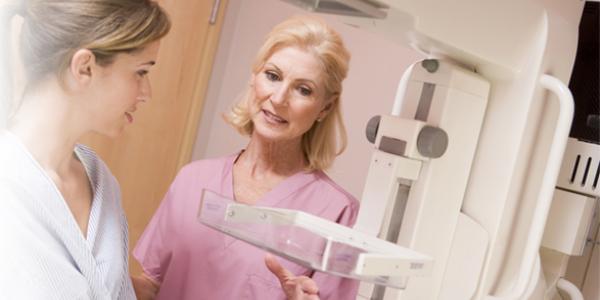
As a woman, we recommend that you get an annual mammogram after turning 40, and possibly earlier if you are at additional risk, or have a family history of breast cancer. But, what if your mammogram comes back inconclusive? Or if you have additional symptoms such as persistent pain or discharge? In cases such as these, additional tests may be ordered to rule out cancer or other disease.
Read below to learn more about these screening and diagnostic tests and why they may be recommended for you. Most breast-cancer-related tests fall into one of the following categories:
- Screening tests: Screening tests (such as yearly mammograms) are given routinely to people who appear to be healthy and are not suspected of having breast cancer. Their purpose is to find breast cancer early, before any symptoms can develop and the cancer usually is easier to treat.
- Diagnostic tests: Diagnostic tests (such as biopsy) are given to people who are suspected of having breast cancer, either because of symptoms they may be experiencing or a screening test result. These tests are used to determine whether or not breast cancer is present and, if so, whether or not it has traveled outside the breast. Diagnostic tests are also used to gather more information about the cancer to guide decisions about treatment.
Screening tests:
- Screening mammograms. We offer digital mammography technology for screening mammograms, which provides a detailed electronic picture of your breast. Images are interpreted by a radiologist with specialized mammography training. Results are typically mailed to you and your doctor within 3 days.
- Whole breast ultrasound. We use sophisticated whole breast ultrasound (ABUS™) technology, which scans all areas of the breast. As the only hospital in Northern California to offer this technology, El Camino Hospital’s diagnostic professionals use whole breast ultrasound to supplement routine mammography and help locate tiny tumors that may be hidden in dense tissue.
Diagnostic tests:
- Diagnostic Mammograms. Diagnostic mammograms are recommended for women who have a breast lump, nipple discharge, prior breast cancer or localized persistent breast pain unrelated to menstrual cycles. A diagnostic mammogram is performed with a radiologist, who can immediately interpret the images, and take a closer look at an area of concern.
- Ultrasound. Breast ultrasound exams use sound waves to evaluate abnormalities found with mammography. It differs from whole breast ultrasound in that a handheld device is used to examine just the areas in question.
- Biopsies. If further evaluation is needed, your doctor may recommend a breast biopsy. During a biopsy, samples of breast tissue are removed and examined under a microscope to see if cancer or other abnormal cells are present. Types of breast biopsies include:
- Fine needle aspiration biopsy – A small needle with a syringe is used to extract a small tissue sample.
- Core needle aspiration biopsy – Similar to a fine needle aspiration, except a slightly larger needle is used to remove multiple, larger tissue samples.
- Open (surgical) biopsy – Requires an incision be made in the breast for tissue to be removed. There are two types of open biopsies: an incisional biopsy is used to remove a portion of the abnormal tissue, while an excisional biopsy is used to remove the entire abnormal area.
- Magnetic Resonance Imaging (MRI). Magnetic resonance imaging uses a large magnet, radio waves and a computer to produce detailed images of the body’s internal structures. During an MRI, you’ll lie very still in a large, tube-shaped machine that creates a strong magnetic field. This field, along with radio waves produced by the MRI machine, works with your body’s own natural magnetic properties to create signals that a computer translates into images.
If your doctor recommends one of the above tests, feel free to ask questions about the test, what to expect, how to prepare, and when you’ll receive the results.
Learn more about the comprehensive Breast Health services offered at the El Camino Hospital Breast Health Center.

